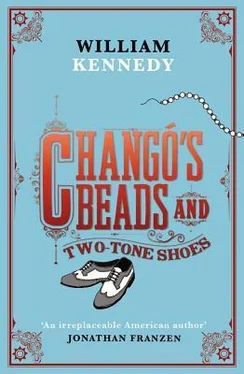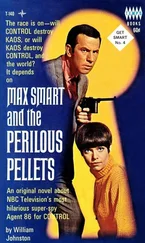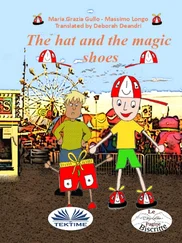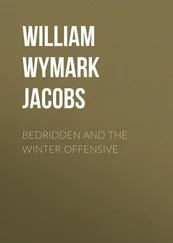William Kennedy
Chango's Beads and Two-Tone Shoes
This book is for
Natalia Bolívar Aróstegui, Norberto Fuentes,
Peter O’Brien, Leon Van Dyke,
and
William Joseph Kennedy, Sr.

Just because my hair is curly . . No. My hair’s not curly, is what occurred to Quinn. The words must have come up and over the hall banister and eased their way into his sleep. Somebody is singing is what it is. Just because I always wear a smile . . Quinn knew the voice. He opened his eyes to no daylight and he listened: ’ Cause, I’m glad I’m livin’ . .
Quinn threw back the sheet that covered him and stood up into the musical darkness. He was still dressed but no shoes. He found them and walked to the hallway and down to the first landing of the stairs where he could look through the uprights of the banister at whoever was singing in the parlor below. It wasn’t the radio, not a Victrola. Somebody in the house was singing. Just because my color’s shady. .
“Bingo, you want the same?” somebody asked.
“Never change horses in a six-furlong race, Alex.” Was it Bingo who answered? Bingo was the singer. There were other men in the parlor: Alex, this was his house, a Negro man Quinn didn’t know, the one Alex calls Bingo, and one who was a stranger to Quinn. The front door opened and Quinn moved two steps down to see his father coming in with two more Negro men who were lifting a small piano over the threshold and onto the marble floor of the foyer.
“One upright piano comin’ at you, Alex,” George Quinn said.
“Into the parlor and behind the large sofa,” Alex said. He pulled a roll of money from his pants pocket and gave it to George, who divided it between the two Negroes. They went out.
“Nice going, George,” Alex said. “You did it.”
“Jimmy was glad to let us borrow it,” George said. “For that kind of money he can buy a new piano.”
Alex went to the bar and poured from a bottle, was it whiskey? He put it in five glasses and passed them out to the others. “To fast horses and beautiful women,” Alex said, raising his glass.
“Or beautiful horses and fast women,” Bingo said.
“Or fast horses and faster women,” the stranger said.
“You’re a speedy citizen, Max,” Bingo said.
“Should I find some beautiful women to join us?” Max asked.
“Patience, Max, patience,” Bingo said.
“This is one hell of a mansion you got here, Alex,” the Negro said.
“The pharaohs didn’t have it this good,” Bingo said.
“Where do we sleep?” the Negro asked.
“You’re in the guest house, Cody,” Alex said. “I’ll give you the tour.”
“I didn’t bring a toothbrush.”
“We’ve got extras.”
“You been here before, Bing?” Cody asked.
“Been to Albany but not in this manse.”
“Bing and I go back a couple of years in Saratoga,” Alex said. “My father bred thoroughbreds and Bing bought one of them.”
Bing, not Bingo.
“A nice horse,” Bing said, “not swift.”
Quinn knew Bing from the radio. Bing Crosby is really singing right here. A party.
“You were with Paul Whiteman,” George Quinn said.
“My traveling days,” Bing said.
“Whiteman got my brother-in-law fired from Riley’s,” George said. “Billy Phelan. Billy was dealing at the crap table and Whiteman asked him for five hundred cash for an IOU. He called Billy ‘sonny.’ ‘Give me five hundred, sonny.’ Billy wouldn’t give it to him and Whiteman said, ‘Do you know who I am?’ And Billy said, ‘Yeah, you’re the guy with that hillbilly band playing over at Piping Rock.’”
“Big Paul loved that,” Bing said.
“They fired Billy.”
“Too bad,” Bing said. “He had a good ear for hillbillies.”
“Music, Cody, we need music,” Alex said.
Cody carried a chair to the piano and sat down. He hit a chord and Bing sang a note and held it. He sang some words: “Just because my hair is curly,
Just because my teeth are pearly. .”
Quinn looked at the five men, trying to understand this gathering. He jounced down a few steps. Bing sang: “Just because my color’s shady,”
Then Cody sang: “You’s a shady baby,”
Then Cody and Bing sang together: “That’s the reason, maybe,
Why they call me shine.”
Cody saw Quinn at the foot of the stairs and stopped playing. “Hey, whose little man are you?”
“That’s Danny, my little man,” George said. “He’s had to follow me around all day and all night. Peg had some work in Atlantic City.”
“Come on, join the party, Dan,” Cody said.
Quinn walked to his father, who put his arm around the boy’s head and squeezed.
“Howdy, Dan,” Bing said. He offered Danny a handshake.
Quinn shook hands and looked at all the men he only half knew. What were they doing? “You’re Bing,” he said.
“Hey, you been followin’ me? You been tappin’ my telephone?”
“I heard you on the radio.”
“Can’t deny it. I’ve been on the radio.”
“He stays up till your show is over,” George said.
“The boy will go far,” Bing said.
Quinn looked at Cody and thought he should also shake hands with him. “You’re going to stay in the guest house,” Quinn said.
“You got a lot of information on people,” Cody said.
“I like that song,” Quinn said. “Shine — what’s that?”
Nobody answered him.
“Shine,” Alex said, “like a shine on your shoes.”
“Or ‘Shine On, Harvest Moon,’” Bing said.
“Like the thing at the end of our kitchen light string,” George said. “It shines in the dark.”
“‘Shine’ ’s a song,” Cody said. “Bing recorded it with the Mills Brothers. You ever heard of the Mills Brothers?”
“No,” Quinn said.
“Well, you should,” Cody said. “Get your daddy to buy you their records.”
“Very great singers,” Bing said.
“‘Shine’ isn’t just a song,” Cody said.
“No,” said Bing. “It’s an insult. A bad word but a great song. The song turns the insult inside out.”
“What insult?” Quinn asked.
“I’ll tell you later,” George said.
“I got a boy like you,” Cody said. “He’s three. How old are you, Danny boy?”
“Eight.”
“My boy’s got five years to catch you.”
“Is he coming here tonight?” Quinn asked.
“No. He’s with his mama.”
“What’s his name?” Quinn asked.
“Roy. He’s a shine. Like me.”
“You’re a shine?” Quinn asked.
“Oh, yeah.”
“I’ll tell you about it in the morning,” George said.
“Can you sing the song again?” Quinn asked.
“Sure can,” Bing said.
Cody turned back to the piano and he and Bing sang one chorus, then Cody played alone, his right hand roaming half the keyboard, his left hand showing how it could ramble, both hands flying at a furious speed that electrified Quinn, made him move his head and his hands and feet in ways he maybe never moved them before, seeing Cody’s racing fingers and hearing, even feeling, the humming sound Cody was making with his mouth.
And then Cody sang: “Bop bop a deep deep deep-a-deep dee. .”
Then Bing sang: “Deet deet du duderidda bombom. .
Doosaday sosadah spokety spone. .
Bahnzay dreeeem doodlediddle diddle diddle diddle diddle…
Читать дальше













